feature
Maybe, baby: the rise of motherhood ambivalence
If it were all down to choice, is deciding to have a baby always a simple yes or no? Of course not, argues Amelia Tait, as she explores the growing honesty around motherhood ambivalence
to have a baby or not to have a baby? that is the question

to have a baby or not to have a baby? that is the question
Everything changed when my fiancé caught the flu. For a couple of days, my schedule transformed – wrapped itself around him like sweaty bedsheets – as I brought him food, drink, medicine, wet flannels, anything and everything he needed until he felt better. He was so grateful. It was the gratitude, actually, that did it. As he thanked me profusely for everything I had done, I was hit by a sudden realisation: I don’t want kids.
My logic went a bit like this: having a child, I reasoned, would be like those two days on repeat; constantly catering to the every whim of someone else, my own needs and wants taking a backseat. But would a child thank me over and over again with fevered eyes? No, they’d simply expect me to tie their shoes, wipe their face, cook their tea, mop up their sick, and – possibly worst of all – help them divide their fractions. I’d be lucky to get a scented candle out of it one Sunday every March.
It might sound to you as though my mind is pretty made up: I am a woman who doesn’t want to procreate. But then a toddler goes and spoils it all by doing something stupid like grabbing my little finger. My thoughts and feelings are what’s known as “motherhood ambivalence”, an increasingly popular term used by counsellors and academics to describe an uncertainty around having children. It’s often assumed that we all have a stance; that girls automatically grow into women who know, innately, whether or not motherhood is for them. But the fact is, so many of us don’t. It is difficult to know exactly how many – most books, movies, and studies focus on either of the two camps, those who are mothers and those who are firmly child-free – but there are clues.

THE MOTHERHOOD SHIFT
Between 2013 and 2018, the number of women in the UK freezing their eggs rose by 523%, while a record number of over-45s gave birth in 2019 (the average age of mothers has been increasing steadily for the past 10 years). A reddit forum for those who are self-described “fence-sitters” when it comes to parenthood gained 32,000 members in the past six years. “It certainly is a more common dilemma that women seem to be facing these days,” says Justine Haddon, a BACP-registered counsellor in Winchester who works exclusively with women. Haddon says the pandemic has caused a rise in ambivalence – perhaps as our lives have been put on hold, we’ve had more time to assess our desires. Haddon’s clients’ concerns are also informed by modern life in general: many are ambivalent about motherhood because they’re “goal driven” and worried about the effect on their careers, and a significant number are also concerned about the climate crisis and current state of the world.
“If we hadn’t had issues with global warming and the political climate, I probably would have automatically just had children without really thinking twice about it,” says Juliet*, a government worker in the South of England who is nearing 30. “But with everything going on at the moment, I’m thinking more than twice: I’m thinking three, four, five times.”
As a child, Juliet experienced health issues – when she was 15, doctors told her she might be unable to have children. This makes her ambivalence all the more complex. At first, she reacted to the news somewhat flippantly, but a school friend’s “horrified” reaction made her upset that she “wouldn’t be able to do something that everyone assumed I would do”. During her 20s, Juliet pushed the thought of children from her mind. Yet after marrying a few years ago, she finds herself feeling an urge to have a child.
“It’s definitely a biological thing, it’s really interesting how it’s developed over the past few years. When I’m holding a friend’s baby I feel this weird urge like, ‘Yes, I want this.’” This feeling contrasts dramatically with Juliet’s fears: “What if, in 50 years’ time, global warming is so bad that there are countries that are becoming uninhabitable, there’s a resource crisis… is it really acceptable to bring a child, knowingly, into a world like that?”

A MATTER OF TIME
Because of Juliet’s health issues, she has less time than expected to make her decision – doctors have told her she shouldn’t wait too long. This kind of time crunch can make ambivalence more distressing for many women, and thanks to the so-called ‘biological clock’, it comes at some point for all of us. “Men have more luxury to be ambivalent. There’s less biological pressure,” says Pragya Agarwal, a behavioural and data scientist and author of (M)otherhood: On The Choices Of Being A Woman, out next month. With women, “there is no time to live with this ambivalence, because it’s almost like you have to make this very important decision very rapidly before time runs out.”
Last year, Erica, a 41-year-old podcast producer from LA, had “a terrible time” with motherhood ambivalence after her gynaecologist asked her whether she was planning to have kids. Although Erica was told she still had “plenty of eggs”, the question made her realise she had a finite amount of time to make her decision. “The narrative that was really agonising for me was, ‘Will I regret this? Will I regret not having children?’”
As a child, Erica had always assumed she would be a mother one day – she even told her mum the name of her future daughter. In her 30s, she struggled with a “longing” for a family of her own that she couldn’t square with the fact that she finds being around children stressful and anxiety-inducing. “It was really hard for me to want to sign up to that indefinitely.” Like many women, Erica felt fearful of regretting her decision either way. For Juliet, too, the choice is a “burden” – Agarwal notes that nearly every woman will have to have the “motherhood conversation” at some point in her life.
“nearly every woman will have to have the ‘motherhood conversation’ at some point in her life”
“There’s this notion that having children and a family is the ideal that everybody has to aspire to,” she says. “And so even if you reject it, there’s always this feeling that you’re rejecting the norm.” Because of this, Agarwal says it can be very difficult to separate our thoughts from societal expectations, family pressures and even our own hormones. “We’re not making choices in a vacuum. These choices are being made with all these expectations, idealisations, pressures, biases, prejudices – everything that we see around us – and that’s why this becomes such a difficult thing to navigate.”
Agarwal’s words resonate with me – I often feel almost betrayed by my biology when I find myself wanting children, but on the flip side, I worry about somehow letting my parents down if they don’t get a grandchild. Like Juliet, I have concerns about the world: could I really tell my daughter, “Yes, we were warned about the climate apocalypse, sorry about giving birth to you, now eat your fried bugs”? I also selfishly worry about sharing my time and money: losing my freedom to travel and make frivolous purchases for myself. I am horrified every time I learn something new about pregnancy, from pooing during delivery to your hair falling out afterwards to ripping your body from vagina to anus.
And then there’s me, myself, my personality. Your brain chemistry literally changes after pregnancy: according to one 2016 study published in Nature Neuroscience, new mothers experience reductions in their grey matter after giving birth. And here I was thinking motherhood would only metaphorically make me lose my mind.

CARRYING THE LOAD
As Agarwal says, it’s hard to divorce my misgivings from age-old perceptions of motherhood: that mums have to sacrifice everything and give up their lives for their child. “There is this idealisation of motherhood,” she explains, “We internalise pressures that we should prioritise our role as a mother before anything or anybody else.” In reality, 75% of mothers in the UK are now working mothers, and flexible working arrangements are increasingly common.
Another ‘but’. Statistics are one thing – what about reality? “We do hear that women can ‘have it all’. But we see around us that actually, once they become mothers, you cannot have it all, you have to compromise and prioritise,” Agarwal says. Awele, a 29-year-old teacher in Dubai, fears sacrificing her freedom, identity and career for kids.
“I feel like we still haven’t solved the question of how to make parenthood fair for women, because it seems like whatever you do, you’re still losing,” says Awele, who loves to travel and is worried about how never-endingly expensive child-rearing is. The fear of the unknown also troubles her: what if her child’s father leaves or dies? “And then what happens to you? You’re just left with a child that you have to raise in a world that I believe is quite hostile to mothers.”
Though Awele has her doubts, her partner is “super, super” religious and “wants tons of children”. Some motherhood ambivalent women may find themselves envious. “I could have married someone who was completely child-free and probably been OK with it. I could have married someone who really wanted children and that might have helped me make decisions,” Juliet says.
“I stopped trying to rationalise my arguments about it. I just kind of let my gut answer the question”
So how can the motherhood ambivalent even begin to confront the enormity of their decision? For many women, there’s a fear that being uncertain automatically means you shouldn’t have a child – but counsellor Haddon says that isn’t the case. “There’s no right or wrong decision,” she says, “Everybody’s situation is completely personal and unique.” Haddon says it is crucial that the ambivalent separate their own expectations from others’. “It’s not necessarily about weighing up the pros and cons, it’s about sitting in your own truth and having self-compassion. You have to value your own choices and needs.”
After marrying last year, Erica finally and firmly hopped off the fence and decided she wasn’t going to have children. This is partly because her husband has adult children who she is a stepmother to, and partly because she underwent a process not unlike that described by Haddon. “I stopped trying to rationalise my arguments about it. I just kind of let my gut answer the question.” Juliet, meanwhile, has bought a book: The Baby Decision by psychotherapist Merle Bombardieri, which features five steps for making up your mind. Awele feels like she can wait until she’s older to come to a conclusion.
All of the women I speak to are grateful to chat about their ambivalence: while none believe it is taboo, it can still be difficult to strip away guilt and shame. Multiple women sheepishly tell me they’re jealous of people who had the decision taken away from them via accidental pregnancy. Agarwal notes that it can be difficult to discuss ambivalence because women are constantly bombarded with questions about motherhood from family, friends, even strangers. “There’s always the ‘What if it gets too late?’ question but there’s never this notion that you’re allowed to change your mind later.”
This point is almost revolutionary to me – that I can reframe the question as one of possibilities, not regrets. For me, approaching 30, I have the luxury of being able to put off the decision for a few years. And yet, unfortunately, this also means more time spent debating with myself. A bout of the flu can make me certain I’ll never have children; a child’s sticky fingers wrapped around my own can instantly undo all my doubts.

Listen to stylist's new podcast
Baby On The Brain is a new podcast and digital franchise from Stylist. Hosted by Felicity Thistlethwaite, the podcast explores the thoughts, feelings and fears that surround impending motherhood. From identity to parental leave, to the inequality of the sacrifices men and women are still expected to make, each episode tackles one of the conundrums that keeps many mums-to-be awake at night.